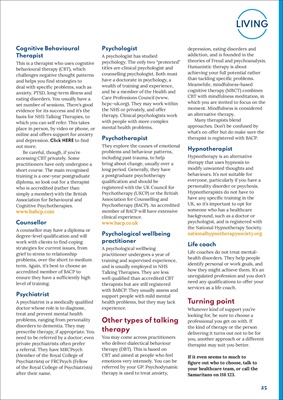
25
LIVING
Cognitive Behavioural
Therapist
This is a therapist who uses cognitive
behavioural therapy (CBT), which
challenges negative thought patterns
and helps you find strategies to
deal with specific problems, such as
anxiety, PTSD, long-term illness and
eating disorders. You usually have a
set number of sessions. There's good
evidence for its success and it's the
basis for NHS Talking Therapies, to
which you can self refer. This takes
place in person, by video or phone, or
online and offers support for anxiety
and depression. Click HERE to find
out more.
Be careful, though, if you're
accessing CBT privately. Some
practitioners have only undergone a
short course. The main recognised
training is a one-year postgraduate
diploma, so look out for a therapist
who is accredited (rather than
simply a member) with the British
Association for Behavioural and
Cognitive Psychotherapies.
www.babcp.com
Counsellor
A counsellor may have a diploma or
degree-level qualification and will
work with clients to find coping
strategies for current issues, from
grief to stress to relationship
problems, over the short to medium
term. Again, it's best to choose an
accredited member of BACP to
ensure they have a sufficiently high
level of training.
Psychiatrist
A psychiatrist is a medically qualified
doctor whose role is to diagnose,
treat and prevent mental health
problems, ranging from personality
disorders to dementia. They may
prescribe therapy, if appropriate. You
need to be referred by a doctor; even
private psychiatrists often prefer
a referral. They have MRCPsych
(Member of the Royal College of
Psychiatrists) or FRCPsych (Fellow
of the Royal College of Psychiatrists)
after their name.
Psychologist
A psychologist has studied
psychology. The only two "protected"
titles are clinical psychologist and
counselling psychologist. Both must
have a doctorate in psychology, a
wealth of training and experience,
and be a member of the Health and
Care Professions Council (www.
hcpc-uk.org). They may work within
the NHS or privately, and offer
therapy. Clinical psychologists work
with people with more complex
mental health problems.
Psychotherapist
They explore the causes of emotional
problems and behaviour patterns,
including past trauma, to help
bring about change, usually over a
long period. Generally, they have
a postgraduate psychotherapy
qualification and should be
registered with the UK Council for
Psychotherapy (UKCP) or the British
Association for Counselling and
Psychotherapy (BACP). An accredited
member of BACP (www.bacp.
co.uk) will have extensive clinical
experience.
Psychological wellbeing
practitioner
A psychological wellbeing
practitioner undergoes a year of
training and supervised experience,
and is usually employed in NHS
Talking Therapies. They are less
well qualified than accredited CBT
therapists but are still registered
with BABCP. They usually assess and
support people with mild mental
health problems, but they may lack
experience.
Other types of talking
therapy
You may come across practitioners
who deliver dialectical behaviour
therapy (DBT). This is based on
CBT and aimed at people who feel
emotions very intensely. You can be
referred by your GP. Psychodynamic
therapy is used to treat anxiety,
depression, eating disorders and
addiction, and is founded in the
theories of Freud and psychoanalysis.
Humanistic therapy is about
achieving your full potential rather
than tackling specific problems.
Meanwhile, mindfulness-based
cognitive therapy (MBCT) combines
CBT with mindfulness meditation, in
which you are invited to focus on the
moment. Mindfulness is considered
an alternative therapy.
Many therapists blend
approaches. Don't be confused by
what's on offer but do make sure the
therapist is registered with BACP.
Hypnotherapist
Hypnotherapy is an alternative
therapy that uses hypnosis to
modify unwanted thoughts and
behaviours. It's not suitable for
everyone, particularly if you have a
personality disorder or psychosis.
Hypnotherapists do not have to have
any specific training in the UK, so
it's important to opt for someone
who has a healthcare background,
such as a doctor or psychologist,
and is registered with the National
Hypnotherapy Society (www.
nationalhypnotherapysociety.org).
Life coach
Life coaches do not treat mentalhealth
disorders. They help people
identify personal or work goals, and
how they might achieve them. It's an
unregulated profession and you don't
need any qualifications to offer your
services as a life coach.
Turning point
Whatever kind of support you're
looking for, be sure to choose a
professional you get on with. If
the kind of therapy or the person
delivering it turns out not to be for
you, another approach or a different
therapist may suit you better.